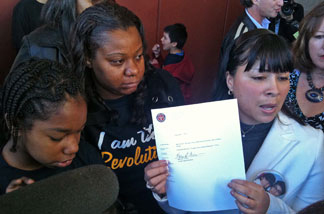Opponents of Parent Trigger legislation, including Bill 1204 currently before the Arizona state senate, rely on two assumptions: the public school system generally doesn’t need serious changes, and parents can’t be trusted with power over their children’s schools.
Let’s first consider the school quality issue. On the 2011 National Assessment of Educational Progress, Arizona fourth graders scored fourth-worst in the country in math and third-worst in reading. Arizona’s eighth graders rated better than only five states in reading and seven states in math. These are the only two grades compared nationally.
It’s clear Arizona education is among the worst in the country. The proposed Parent Trigger legislation would apply only to the state’s D- and F-rated schools—the worst of the nation’s worst. Anyone arguing that such schools shouldn’t have to change ought to be forced to have their own children attend them for 12 years.
No one gets a second chance at childhood, and what children learn determines their future ability to cope with life—to make good personal choices, find a job they enjoy, think critically about advertising and political sloganeering, enjoy culture, manage their personal finances, save for retirement, and so much else.
Parent Trigger proponents understand that Arizona’s schools must change. The kind of change they’re calling for is simply parent power. The Parent Trigger and other consumer-oriented education reforms rest on the principle that parents are best equipped and most motivated to know their children’s needs and choose the right type of education for them. Opponents argue parents are too ill-informed and easily swayed to wield such power.
It is true that parents are human, and thus fallible and sometimes even gullible. But so are teachers, administrators, and special-interest leaders. Maybe that’s one reason why Arizona’s public schools are so disastrously bad.
A wise policy takes into account the motivations of each of the interested parties and decides which to prioritize. Parents win that comparison. They are the only people who have known a child from birth. They alone have calmed their children’s night terrors and dreamed vividly of a better future for them. The only people whom a child keeps up most nights are his parents. This is why some parents will sacrifice retirement and college savings to pay taxes plus private school tuition.
The sacrifice is admirable, but society shouldn’t force sacrifices when it can offer freedom. SB1204 would give parents of children in a terrible school a chance to have it closed, converted to a charter school, or given a new principal with more administrative flexibility. It also would make every child attending one of these schools eligible for an education savings account, where a parent receives direct control over the child’s state education dollars and can divvy them among expenses like tuition, tutoring, or textbooks, or save them for college.
Because parents naturally care more deeply for their children than anyone else, they are their children’s best advocates. Many people like to say they care for children, and they may well believe this sincerely, but to care about children en masse or in the abstract is different from caring for them 24-7.
If some parents aren’t capable of doing sufficient investigation to find the very best schools for their children, the kids could hardly be worse off than they are today in the worst current public schools. And those who do have the ability to find better schools will see their children benefit immensely.
That’s the real power of choice, and it’s what makes the Parent Trigger such an individual and social benefit.
Joy Pullmann (j[email protected]) is managing editor of School Reform News and a research fellow in education at The Heartland Institute.





